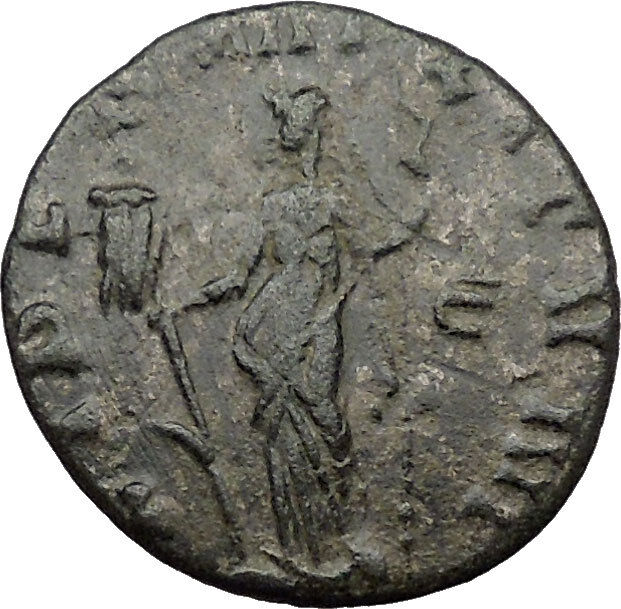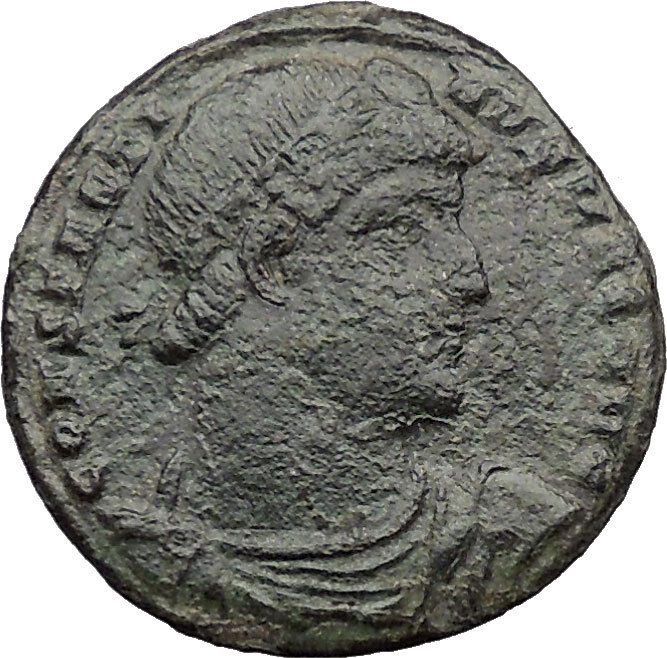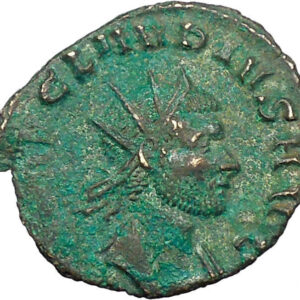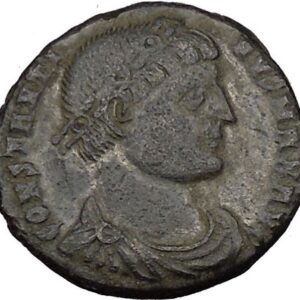|
Septimius Severus
–
Roman Emperor
: 193-211 A.D. –
Silver Denarius 18mm (2.89 grams) Rome mint: 205 A.D.
Reference: RIC 197, S 6337, C 470
SEVERVSPIVSAVG – Laureate head right.
PMTRPXIIICOSIIIPP – Virtus standing left, holding Victory and spear.
You are bidding on the exact item pictured,
provided with a Certificate of Authenticity and Lifetime Guarantee of
Authenticity.
Virtus was a specific
virtue
in
Ancient Rome
. It carries connotations of valor,
manliness, excellence, courage, character, and worth, perceived as masculine
strengths (from Latin
vir, “man”). It was thus a
frequently stated virtue of
Roman emperors
, and was personified
as a deity
.
Origins
The origins of the word virtus can be traced back to the Latin word
vir, “man”. The common list of attributes associated with virtus are
typically perceived masculine strengths, which may indicate its derivation from
vir. From the early to the later days of the Roman Empire, there appears
to have been a development in how the concept was understood.
Originally virtus was used to describe specifically martial courage,
but it eventually grew to be used to describe a range of Roman virtues. It was
often divided into different qualities including prudentia (prudence),
iustitia
(justice),
temperantia
(temperance,
self-control), and
fortitudo
(courage). This division of
virtue as a whole into
cardinal virtues
is today classified as
virtue ethics
, as described by
Plato
‘s
Republic
and
Aristotle
‘s
Nicomachean Ethics
. It implies a link
between virtus and the Greek concept of
arete
.
This inclusion leads to the belief that at one time virtus extended to
cover a wide range of meanings that covered one general ethical ideal. The use
of the word began to grow and shift to fit the new idea of what manliness meant.
No longer did virtus mean that a person was a brave warrior but it could
also mean that he was a good man, someone who did the right thing. During the
time of the decline of the Roman elite virtus the Roman upper class no
longer thought of themselves as unmanly if they did not serve in the military.
Virtue as described by Aristotle was rediscovered in the medieval age by
Muslim
philosopher
Averroes
, which in turn impacted
Thomas Aquinas
to fuse virtue ethics with
Christianity in connection with the
Renaissance of the 12th century
.
In Roman
political philosophy
Virtus comes from the aristocratic tradition in which it is a specific
type of public conduct. It is really only applicable in the
cursus honorum
, certainly by the late
republic at least. It is not a “private” virtue in the way that modern people
might consider it. Valor, courage, and manliness are not things that can be
pursued in the private sphere of the individual or the individual’s private
concerns. There could be no virtue in exploiting one’s manliness in the pursuit
of personal wealth, for example. virtus is exercised in the pursuit of
gloria for the benefit of the
res publica
resulting in the winning of
eternal “memoria.” According to D.C. Earl “Outside the service of the res
publica there can be no magistratus and therefore, strictly speaking,
no gloria, no nobilitas, no virtus“.
For the nobility virtus lies not only in one’s personal “acta” but
also that of one’s ancestors. However Cicero, a
novus homo
, asserted that virtus was
a virtue particularly suited to the new man just as nobilitas was suited to the
noble. Cicero argued that just as young men from noble families won the favor of
the people so too should the novus homo earn the favor of the people with his
virtus. He even extended the argument that virtus and not one’s
family history should decide a man’s worthiness. Virtus is something that
a man earns himself, not something that is given to him by his family, thus it
is a better measure of a man’s ability. Cicero’s goal was not to impugn the
noble class but widen it to include men who had earned their positions by merit.
The term was used quite significantly by the historian
Sallust
, a contemporary of Cicero. Sallust
asserted that it did not rightfully belong to the nobilitas as a result
of their family background but specifically to the
novus homo
through the exercise of
ingenium (talent). For Sallust and Cicero alike, virtus is situated
in the winning of glory by the execution of illustrious deeds (egregia
facinora) and the observance of right conduct through bonae artes.
Who could have it?
Virtus was not universally applicable to just anyone – generally
(although not always exclusively) only adult male Roman citizens would be
thought of as possessing virtus.
Women
Virtus was rarely to women, likely because of its association with
vir. The highest regarded female virtue was pudicitia: “modesty” or
“chastity”. Cicero
, however, attributes this characteristic
to females several times. He uses it once to describe
Caecilia Metella
when she helps a man who is
being chased by assassins. Twice more he uses it when describing his daughter,
Tullia
, portraying her in his letters as brave
in his absence. He uses it again to describe his first wife
Terentia
during his exile. Livy in Book 2
attributes it to Cloelia.
Children
Virtus was not a term commonly used to describe children. Since
virtus was primarily attributed to a full grown man who had served in the
military, children were not particularly suited to obtain this particular
virtue.
Slaves
While a
slave
was able to be homo (“man”) he was
not considered a vir. Slaves were often referred to as puer (Latin
for boy) to denote that they were not citizens. Since a slave could not
be a vir it follows that they would not be allowed to have the quality of
virtus. Once a slave was manumitted he was able to become a vir
and he was also classified as a freedman but this did not allow him to have
virtus. A good slave or freedman was said to have fides, but no
virtus.
Foreigners
Foreigners
in the Roman world could be
attributed with virtus: If they fought bravely they could be said to have
virtus. Virtus could also be lost in battle. Virtus could
even be a cause to gain citizenship as in the case of Spanish cavalry men
granted citizenship by Cn. Pompeius Strabo in 89 B.C.E. for their virtus
in battle.
How was it used?
Virtus applies exclusively to a man’s behaviour in the public sphere,
i.e. to the application of duty to the
res publica
in the
cursus honorum
. His private business was no
place to earn virtus, even when it involved courage or feats of arms or
other qualities associated to it if performed for the public good.
In private
While in many cultures around the world it is considered “manly” to father
and provide for a family, family life was considered in the Roman world to be
part of the private sphere. During this time there was no place for virtus
in the private sphere. Most uses of virtus to describe any part of
private life are ambiguous and often refer to another similar quality.[11]
In the Roman world the oldest living patriarch of the family was called the
pater familias
and this title implied that
he was able to make all legal and binding decisions for the family; he also
owned all the money, land, and other property. His wife, daughters, sons, and
his sons’ families were all under his
potestas
. The only time a son was seen as
separate from his father’s control in the eyes of other Romans was when he
assumed his public identity as a citizen. He could earn his virtus by
serving in the military, and thus could only demonstrate manliness outside of
the family setting. This is another reason that virtus is not often used
to describe the Roman private life.
In public
Virtus was a crucial component for a political career. Its broad
definition led to it being used to describe a number of qualities that the Roman
people idealized in their leaders.
In everyday life a typical Roman, especially a young boy, would have been
inculcated with the idea of virtus. Since military service was a part of
most Roman men’s life, military training would have started fairly early. Young
boys would have learned how to wield weapons and military tactics starting at
home with their fathers and older male relatives and later in school. Also as a
young boy one would have heard numerous stories about past heroes, battles, and
wars. Some of these stories would have surely told of the virtus of past
heroes, and even family members. Publicly it was easy to see the rewards of
virtus. Public triumphs were held for victorious generals and rewards were
given to brave fighters. All of this propaganda would have encouraged young boys
coming into their manhood to be brave fighters and earn the attribute of
virtus. It was the duty of every generation of men to maintain the
dignitas
which his family had already
earned and enlarge it. This pressure to live up to the standards of one’s
ancestors was great. In achieving virtus one could achieve
gloria
. By gaining virtus and
gloria one could hope to aspire to high political office and great renown.
While young boys were encouraged to earn virtus there were also limits
put on showing virtus in public. Virtus was often associated with
being aggressive[citation
needed] and this could be very dangerous in the
public sphere and the political world. Displays of violent virtus were
controlled through several methods. Men seeking to hold political office
typically had to follow the
cursus honorum
. Many political offices had
an age minimum which ensured that the men filling the positions had the proper
amount of experience in the military and in government. This meant that even if
a man proved himself capable of filling a position or was able to persuade
people that he was capable, he would not necessarily be able to hold the
position until he had reached a certain age. This also served to ensure that in
elections of public offices no one had a certain advantage over another person
because by the time most men went into public office they would have retired
from military service. Furthermore, before any Roman soldier could partake in
single combat he had to gain permission from his general. This procedure was
meant to keep soldiers from putting themselves in extremely dangerous situations
that they may or may not have been able to handle in order gain virtus.
The concept of virtus also tended to be a concept of morality as far
as politics were concerned. This could range from the very literal definition of
manliness seen in aggression and the ruthless acquisition of money, land, and
power, or the lighter, more idealistic political meaning which almost took on
the extended meaning of “pietas”, a man who was morally upright and concerned
with the matters of the state. Plautus in
Amphitruo
contrasted virtus and
ambitio. Virtus is seen as a positive attribute, though ambitio
itself is not necessarily a negative attribute but is often associated with
negative methods such as bribery.
Plautus
said that just as great generals and
armies win victory by virtus, so should political candidates. Ambitio
“is the wrong method of reaching a good end.” Part of virtus, in the
political sphere was to deal justly in every aspect of one’s life, especially in
political and state matters.
Military
Although the two concepts are related, virtus, for the Roman, did not
necessarily emphasize the behavior that the associations of the present-day
English term ‘virtue’ suggest. Virtus was to be found in the context of
‘outstanding deeds’ (egregia facinora), and brave deeds were the
accomplishments which brought gloria (‘a reputation’). This gloria
was attached to two ideas: fama (‘what people think of you’) and
dignitas (‘one’s standing in the community’). The struggle for virtus
in Rome was above all a struggle for public office (honos), since it was
through aspiring to high office, to which one was elected by the People, that a
man could best show his manliness by means of military achievement which would
in turn cultivate a reputation and votes. It was the duty of every aristocrat
and would-be aristocrat to maintain the dignitas which his family had
already achieved and to extend it to the greatest possible degree, through
higher political office and military victories. This system resulted in a strong
built-in impetus in Roman society to engage in military expansion and conquest
at all times.
Sexuality
While in many cultures the virtue of manliness is also seen as being partly
sexual, in the Roman world virtus apparently did not have sexual
connotations. Similar words deriving from the same stem often have sexual
connotations. In the Roman world virtus dealt with a great many areas
such as martial courage, honor, and being morally upright rather than sexual
manliness.
Examples
One of the most well known demonstrations of virtus was shown by
Lucius Quinctius Cincinnatus
. Before
Cincinnatus was appointed dictator in 458 BCE, Rome was in the midst of a battle
with the Aequi
and needed someone to take control.
Messengers sent to fetch him found him plowing in his field. Upon being informed
of the appointment, he wept saying, “So my field will be unsown this year, and
we shall be in danger of not having enough food to support us.”[16]
Nevertheless, he dutifully gathered his things, kissed his wife goodbye and
departed to raise an army and defeat the Aequi in a mere fifteen days. Upon
returning home after the victory, Cincinnatus picked up the plough from where he
left it and began plowing again.
Dionysius of Halicarnassus
recounts this story
to illustrate the type of leaders the men of Rome were. He says that they
“worked with their hands, led self-disciplined lives, did not complain about
honorable poverty, and far from pursuing positions of royal power.”
Pompey
is another prominent example of
virtus. In 55 BCE, Pompey inaugurated his grand theatre complex and
dedicated several shrines to different gods, one of these being Virtus.
This consecrated Pompey’s link with virtus. He gained a reputation with
the public as being a man of virtus. Cicero, throughout his speech, the
De imperio Cn. Pompei, connects Pompey with “divina virtus”.[18]
Pompey was so closely connected with virtus that once during a production
of a play at the
Ludi Apollinares
one of the characters
spoofed Pompey by stating “eandem virtutem istam veniet tempus cum graviter
gemes”: “The time will come when you bitterly resent that same virtus“.
The audience did not need to hear his name to know that Pompey was being
referenced.
Marcellus and the
Temple
M. Claudius Marcellus
, during the battle of
Clastidium
in 222 BCE, dedicated a temple to
Honos
and Virtus. This was one of the first
times that Virtus had been recognized as divine. The connection with
Honos would have been obvious to most Romans as demonstrations of virtus
led to election to public office and both were considered honos. The cult
of Honos was already a long-standing tradition in Rome. The marriage of
the two deities ensured that Virtus would also get proper respect from
the Romans. But an objection by the pontiffs was that one temple could not
properly house two gods because there would be no way of knowing which god to
sacrifice to should a miracle happen in the temple.
L ucius Septimius Severus (or rarely Severus I) (April 11, ucius Septimius Severus (or rarely Severus I) (April 11,
145/146-February 4, 211) was a
Roman
general, and
Roman
Emperor
from April 14, 193 to 211. He was born in what is now the
Berber
part of
Rome’s historic
Africa Province
.
Septimius Severus was born and raised at
Leptis
Magna
(modern Berber
, southeast of
Carthage
,
modern Tunisia
).
Severus came from a wealthy, distinguished family of
equestrian
rank. Severus was of
Italian
Roman ancestry on his mother’s side and of
Punic
or
Libyan
-Punic
ancestry on his father’s. Little is known of his father,
Publius Septimius Geta
, who held no major political status but had two
cousins who served as consuls under emperor
Antoninus Pius
. His mother, Fulvia Pia’s family moved from
Italy
to
North
Africa
and was of the
Fulvius
gens,
an ancient and politically influential clan, which was originally of
plebeian
status. His siblings were a younger
Publius Septimius Geta
and Septimia Octavilla. Severus’s maternal cousin was
Praetorian Guard
and consul
Gaius Fulvius Plautianus
.
In 172, Severus was made a
Senator
by the then emperor
Marcus Aurelius
. In 187 he married secondly
Julia
Domna
. In 190 Severus became
consul
, and in
the following year received from the emperor
Commodus
(successor to Marcus Aurelius) the command of the
legions
in Pannonia
.
On the murder of
Pertinax
by
the troops in 193, they proclaimed Severus Emperor at
Carnuntum
,
whereupon he hurried to Italy. The former emperor,
Didius Julianus
, was condemned to death by the Senate and killed, and
Severus took possession of Rome without opposition.
The legions of
Syria
, however, had proclaimed
Pescennius Niger
emperor. At the same time, Severus felt it was reasonable
to offer
Clodius Albinus
, the powerful governor of Britannia who had probably
supported Didius against him, the rank of Caesar, which implied some claim to
succession. With his rearguard safe, he moved to the East and crushed Niger’s
forces at the
Battle of Issus
. The following year was devoted to suppressing Mesopotamia
and other Parthian vassals who had backed Niger. When afterwards Severus
declared openly his son
Caracalla
as successor, Albinus was hailed emperor by his troops and moved to Gallia.
Severus, after a short stay in Rome, moved northwards to meet him. On
February
19
, 197
,
in the
Battle of Lugdunum
, with an army of 100,000 men, mostly composed of
Illyrian
,
Moesian
and
Dacian
legions,
Severus defeated and killed Clodius Albinus, securing his full control over the
Empire.
Emperor
Severus was at heart a
soldier
, and
sought glory through military exploits. In 197 he waged a brief and successful
war against the
Parthian Empire
in retaliation for the support given to Pescennius Niger.
The Parthian capital
Ctesiphon
was sacked by the legions, and the northern half of
Mesopotamia
was restored to Rome.
His relations with the
Roman
Senate
were never good. He was unpopular with them from the outset, having
seized power with the help of the military, and he returned the sentiment.
Severus ordered the execution of dozens of Senators on charges of corruption and
conspiracy
against him, replacing them with his own favorites.
He also disbanded the
Praetorian Guard
and replaced it with one of his own, made up of 50,000
loyal soldiers mainly camped at
Albanum
, near Rome (also probably to grant the emperor a kind of centralized
reserve). During his reign the number of legions was also increased from 25/30
to 33. He also increased the number of auxiliary corps (numerii), many of
these troops coming from the Eastern borders. Additionally the annual wage for a
soldier was raised from 300 to 500
denarii
.
Although his actions turned Rome into a military
dictatorship
, he was popular with the citizens of Rome, having stamped out
the rampant corruption of Commodus’s reign. When he returned from his victory
over the Parthians, he erected the
Arch of Septimius Severus
in Rome.
According to Cassius Dio,
however, after 197 Severus fell heavily under the influence of his Praetorian
Prefect,
Gaius Fulvius Plautianus
, who came to have almost total control of most
branches of the imperial administration. Plautianus’s daughter,
Fulvia Plautilla
, was married to Severus’s son, Caracalla. Plautianus’s
excessive power came to an end in 205, when he was denounced by the Emperor’s
dying brother and killed.
The two following praefecti, including the jurist
Aemilius Papinianus
, received however even larger powers.
Campaigns in Caledonia (Scotland)
Starting from 208 Severus undertook a number of military actions in
Roman
Britain
, reconstructing
Hadrian’s Wall
and campaigning in
Scotland
.
He reached the area of the
Moray
Firth
in his last campaign in Caledonia, as was called Scotland by
the Romans..
In 210 obtained a peace with the
Picts
that lasted
practically until the final withdrawal of the Roman legions from Britain,
before falling severely ill in
Eboracum
(York).
Death
He is famously said to have given the advice to his sons: “Be harmonious,
enrich the soldiers, and scorn all other men” before he died at Eboracum on
February 4
,
211. Upon his death in 211, Severus was
deified
by the Senate and succeeded by his sons,
Caracalla
and
Geta
, who were advised by his wife
Julia
Domna
. The stability Severus provided the Empire was soon gone under their reign.
Accomplishments and Record
Though his military expenditure was costly to the empire, Severus was the
strong, able ruler that Rome needed at the time. He began a tradition of
effective emperors elevated solely by the military. His policy of an expanded
and better-rewarded army was criticized by his contemporary
Dio Cassius
and
Herodianus
: in particular, they pointed out the increasing burden (in the
form of taxes and services) the civilian population had to bear to maintain the
new army.
Severus was also distinguished for his buildings. Apart from the triumphal
arch in the Roman Forum carrying his full name, he also built the
Septizodium
in Rome and enriched greatly his native city of
Leptis
Magna
(including another triumphal arch on the occasion of his visit of
203).
Severus and Christianity
Christians were
persecuted
during the reign of Septimus Severus. Severus allowed the
enforcement of policies already long-established, which meant that Roman
authorities did not intentionally seek out Christians, but when people were
accused of being Christians they could either curse
Jesus
and make an
offering to
Roman gods
, or be executed. Furthermore, wishing to strengthen the peace by
encouraging religious harmony through
syncretism
,
Severus tried to limit the spread of the two quarrelsome groups who refused to
yield to syncretism by outlawing
conversion
to Christianity or
Judaism
.
Individual officials availed themselves of the laws to proceed with rigor
against the Christians. Naturally the emperor, with his strict conception of
law, did not hinder such partial persecution, which took place in
Egypt
and the
Thebaid
, as
well as in
Africa proconsularis
and the East. Christian
martyrs
were
numerous in Alexandria
(cf.
Clement of Alexandria
, Stromata, ii. 20;
Eusebius
, Church History, V., xxvi., VI., i.). No less severe were
the persecutions in Africa, which seem to have begun in 197 or 198 (cf.
Tertullian’s
Ad martyres), and included the Christians known in the
Roman martyrology
as the martyrs of
Madaura
.
Probably in 202 or 203
Felicitas
and
Perpetua
suffered for their faith. Persecution again raged for a short time
under the proconsul
Scapula
in
211, especially in
Numidia
and
Mauritania
.
Later accounts of a Gallic
persecution, especially at
Lyon, are
legendary. In general it may thus be said that the position of the Christians
under Septimius Severus was the same as under the
Antonines
;
but the law of this Emperor at least shows clearly that the
rescript
of
Trajan
[
neededclarification] had failed to execute its purpose.
|





 ucius Septimius Severus (or rarely Severus I) (April 11,
ucius Septimius Severus (or rarely Severus I) (April 11, 


